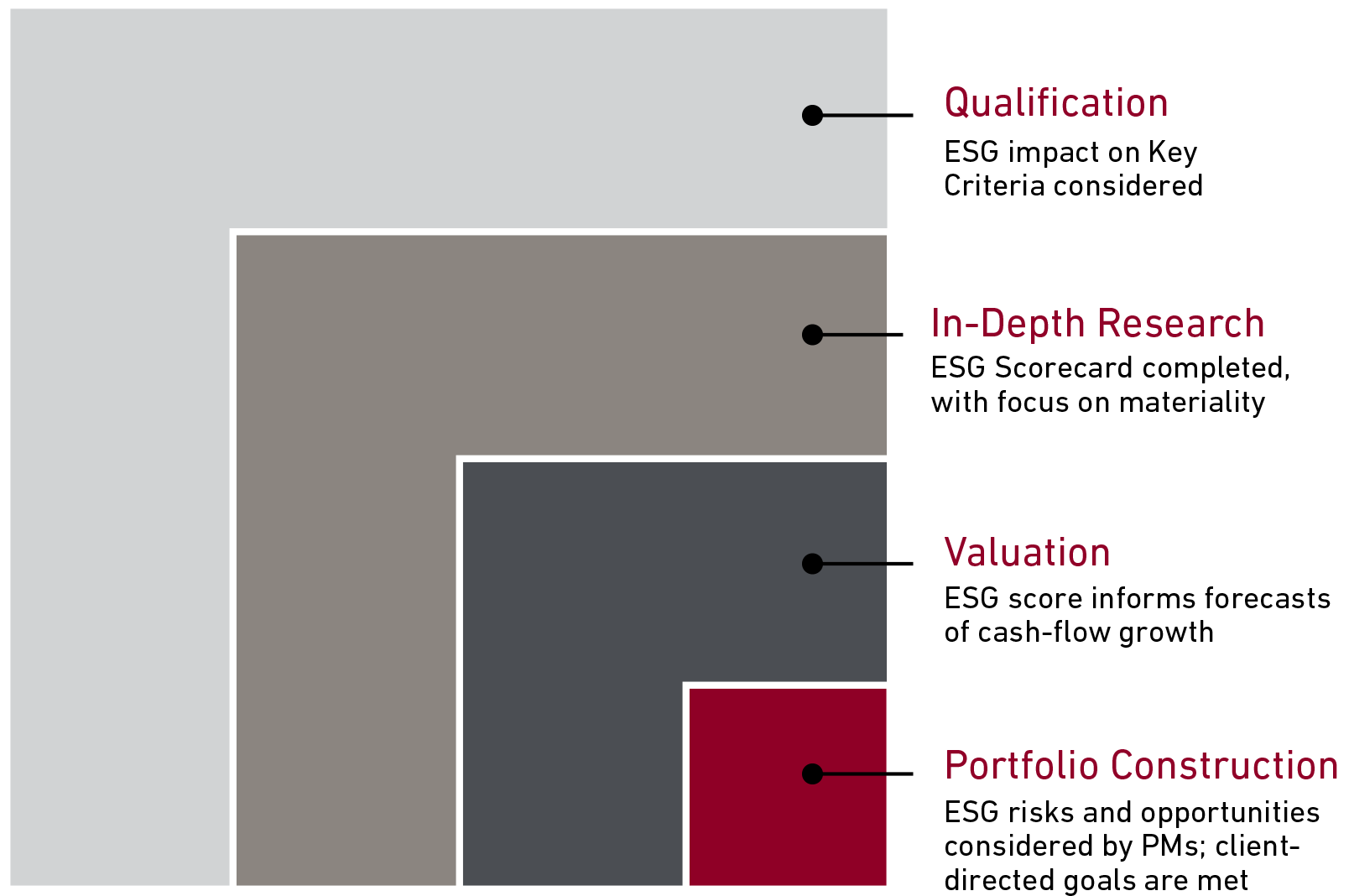How Harding Loevner Invests Responsibly
This page outlines Harding Loevner’s responsible approach to investing, which encompasses the following dimensions:1
- Responsible Investment Selection
- ESG screening: eliminating securities of poorly governed companies;
- ESG integration: considering Environmental, Social and Governance risk and return factors in the security selection process; and
- Accountability for ESG incorporation: overseeing and implementing responsible investment policies.
- Active Ownership
- Voting: voting all proxies in the interests of our clients, the asset owners, as we best determine or as they direct;
- Company engagement: engaging with managements of companies in which we have invested for the purpose of influencing their behavior for the benefit of public shareholders such as our clients, the asset owners, including with respect to managements’ consideration of ESG issues that affect expected risks and returns; and
- Institutional support for active ownership: adhering to the Principles for Responsible Investment and the UK Stewardship Code.
- Meeting Client Goals
- Client-directed screening: eliminating securities of companies engaged in activities or practices that our client, the asset owner, seeks to avoid;
- ESG benchmarking: managing portfolios with reference to ESG-influenced market indices selected by our client, the asset owner;
- Climate-related strategies: managing portfolios focused on investments only in companies with a viable pathway to achieving net zero greenhouse gas emissions; and
- Client-directed engagement: engaging with portfolio holdings on behalf of clients on the issues most important to our clients.
Responsible Investment Selection:
We are a global equities manager seeking to achieve superior risk-adjusted returns for our clients by identifying high-quality, sustainably growing companies through in-depth fundamental analysis. Companies that operate with disregard for their environment, for the welfare of the societies in which they conduct their business, or for the sound principles of governance by which the interests of shareholders are protected put their financial results at long-term risk. Alternatively, companies may strengthen their long-term prospects by identifying and mitigating material ESG-related risks or by taking advantage of new opportunities that may arise from material ESG-related trends. Therefore, consideration of environmental, social, and corporate governance issues is intrinsic to our investment process.
Our investment selection approach, by its design, eschews companies engaging in unsustainable business practices or pursuing short-term profits at the expense of long-term growth and stability. We believe only companies that can create substantial long-term value are capable of producing meaningful “shared value” for the benefit of larger society as well as for shareholders and other direct stakeholders.2
ESG Screening
At the outset of their work on a company, the analyst completes a 14-point corporate governance checklist to ensure they eliminate companies with demonstrably poor governance from further consideration. The analyst also completes a 15-point environmental and social red flag checklist to determine if the company faces any severe environmental and social risks that require closer analysis.
HL Investment Process: ESG Integration

ESG Integration
We include into our equity security evaluation an explicit consideration of ESG factors. Competitive advantage, sustainable growth, financial strength, and quality management are the criteria by which we judge whether a company can sustain high returns on capital. ESG factors are among those that may threaten, or support, a company’s ability to continue to meet one or more of these criteria; therefore, ESG risks and opportunities are considered at each stage of our investment process.
For each company under our coverage, the analyst uses Harding Loevner’s ESG Scorecard to assess the potential impact of 29 distinct ESG factors on the company’s ability to grow profitably and sustainably. The Scorecard provides a consistent framework for comparing companies’ potential ESG risks and opportunities across all industries and geographic regions. The ESG factors addressed in the Scorecard include, for example, climate change, treatment of customers, labor practices, community relations, cybersecurity, and management-shareholder alignment. ESG assessments inform the analyst’s long-term forecasts of a company’s growth, margins, capital intensity, and competitive position. In addition, the analyst determines an overall ESG Score for each company; the ESG Score is an input into our valuation model that influences the projected duration of future cash flow growth.
Portfolio managers consider ESG factors among other factors affecting risk and expected returns when constructing model portfolios from qualified investments. The model portfolios are the templates used for managing client accounts.
Accountability for ESG Incorporation
Our Chief Investment Officer oversees Harding Loevner’s investment process, including our responsible investing policies. He approves the elements of the firm’s ESG Scorecard, which is the framework our analysts use to assess companies’ ESG risks and opportunities. Our Director and Co-Deputy Directors of Research are responsible for ensuring that tools and resources for ESG analysis, such as the Scorecard, are available to analysts and are consistently used by them. Analysts are accountable for the quality and completeness of their company and industry research, which incorporates their assessments of the potential impact of ESG risks and opportunities on the sustainability of companies’ cash flows. Our ESG Analyst supports analysts in their ESG integration work and reports to the abovenamed senior managers on its effectiveness. Our team also includes an ESG Associate who provides ESG research support to the investment team. Harding Loevner’s ESG Strategist supports the client and business development teams on ESG initiatives, with a particular focus on the reporting required by various regulatory frameworks to meet the needs of clients and prospective investors.
Active Ownership:
Voting
Wherever clients have delegated authority to us, we vote all proxies with our clients’ best interest in mind. As active owners, we seek to use our voting power to promote high standards of corporate governance, including provision of adequate disclosure of company policies, activities, and returns, as well as fair and equitable treatment of shareholders.
We vote in favor of management proposals that we believe will benefit shareholders. We support company boards in aligning management with shareholder returns through remuneration policies. In addition, we support board independence, including in the composition of individual committees as well as the board overall. We demand that firms maintain adequate disclosures, provide clear information in financial reporting, and offer regular management access to shareholders. If a company proposes a policy that we believe will damage long-term shareholder value, we will vote against it.
The analyst who covers a company determines how to vote on proposals in accordance with these general principles. To support analysts’ independent consideration of proposals, we obtain research and recommendations from corporate governance consultant Glass Lewis. Complex or controversial issues are debated by our investment team, with the ultimate decision remaining with the responsible analyst, who knows the company best. We record all votes—along with the rationale for our deviations from the recommendations of management—and disclose our votes to the respective asset owners upon request. All votes against recommendations of management require engagement with management.
Company Engagement
Harding Loevner has three-pronged engagement strategy that includes our analysts’ research-related engagements, proxy voting-related engagement, and structured engagements on particular topics. We also engage with companies on behalf of clients upon request.
Research-Related Engagement
Analysts commonly engage with company management as part of the initial research process, and as a matter of course in the ongoing monitoring of qualified companies.
We engage on a range of topics including company board composition and director election, climate change and energy transition, and human rights. When we disagree with certain business practices or management policies, we encourage a course correction by exercising our influence as shareholders. If we believe that management decisions or strategies will cause a company to no longer to meet our key investment criteria or result in unacceptably high risk, we will disinvest from the company.
Proxy-Voting-Related Engagement
Harding Loevner votes all proxies on behalf of clients who have delegated such authority to us. We have a fiduciary duty to act solely in the best interest of our clients, including exercising voting rights to maximize shareholder value.
Whenever Harding Loevner casts a vote against management’s recommendation, the analyst writes to management to highlight and explain the basis for our dissent, inviting further dialog.
Structured Engagement
We execute structured engagements to encourage the companies we have researched to identify material ESG risks to their businesses and to provide regular reporting of material ESG metrics. In these structured engagements, we screen company disclosures to determine whether they have identified key relevant ESG risks and provide regular reporting on key ESG metrics. Our ESG Analyst and the covering sector analyst then conduct follow-up conversations with management regarding matters identified in our screening to help raise their awareness of emergent ESG issues, global regulatory ESG developments, disclosure frameworks, and third-party ESG resources. We also provide examples of best-in-class reporting by relevant peers.
Institutional support for Active Ownership
Harding Loevner supports collective efforts to promote Responsible Investing as a signatory of the PRI, the UK Stewardship Code, and TCFD. Our firm is also a member of the Partnership for Carbon Accounting Financials (PCAF) and the Institutional Investors Group in Climate Change (IIGCC) as well as a signatory of CDP Worldwide. As a supplement to its own Code of Ethics, Harding Loevner adheres to the CFA Institute’s Asset Manager Code.
Meeting Client Goals:
Wherever possible we support our clients, the asset owners, in pursuing their investment goals.
Client-directed Screening
For many of our clients, we avoid investment in companies engaged in activities or practices at odds with their values, mission, or religious beliefs. We manage separate account portfolios to follow closely our unconstrained strategy model portfolios while complying with any client-directed prohibitions on specific investments, or restrictions on investing in producers or sellers of certain products such as tobacco, alcohol, coal, weapons, or adult entertainment. We manage substantial client assets according to Catholic and other religious principles, with guidance provided by or developed in conjunction with the client.
Climate-Related Strategies
In recognition of the increased focus of many investors on the global problem of rising greenhouse gas levels, Harding Loevner launched two products that seek long-term capital appreciation through investments in high-quality, growing companies worldwide that our analysts believe have a viable pathway to achieving net-zero greenhouse gas emissions by 2050, in alignment with the Paris Agreement. The Global Paris-Aligned Equity strategy and International Carbon Transition strategy exclude emissions-intensive companies that do not have a viable path to net zero, as well as companies holding fossil fuel reserves or deriving significant revenues from fossil-fuel-related activities.
ESG Benchmarking
For clients wishing to incorporate independent sources’ ESG assessments of companies in the management of their portfolios, we manage separate portfolios against ESG index benchmarks, such as the MSCI All Country World ESG Leaders Index.
Client-Directed Engagement
We also engage with companies on behalf of our clients. For example, we have collaborated with a client invested in our Global Equity strategy to engage annually with every portfolio holding on issues important to the client: 1) the company’s progress in identifying ESG risks and reporting on material ESG issues, and 2) the company’s alignment with 1.5°C emission reduction targets and whether the company has adopted TCFD-aligned reporting. Other engagement topics we have pursued include geopolitical risk, board independence, and human capital development.
1We acknowledge our debt to AQR and the PRI for suggesting this framework for organizing a discussion of the various aspects of investing responsibly. AQR, Clearing the Air: Responsible Investment, (May 2019)
2Michael E. Porter, George Serafeim & Mark Kramer, “Where ESG Fails,” Institutional Investor, (October 16, 2019)



